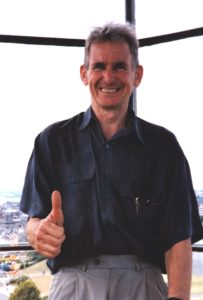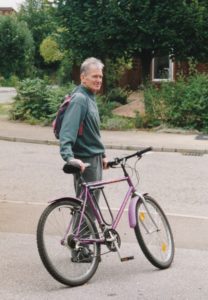Ray Thomas, In Memoriam

In memoriam of Ray Thomas, an economist, statistician, pioneer of the Open University, and member of the team that produced ‘The Containment of Urban England’.
By David Webster and Simon Briscoe
:Ray Thomas 10 December 1930 – 22 April 2018, was an economist who made major contributions as an expert on New Towns, as a teacher, and as a statistician concerned with the truthful portrayal of society:

Ray was born in London in 1930 to Kitty and Melville Thomas, his father being a successful businessman who invented a new welding technique for stainless steel. The family moved to Birmingham and Ray attended Moseley Grammar School. After going straight to National Service with the King’s Royal Hussars from 1949 to 1951, he studied economics and political institutions at the recently founded University of North Staffordshire at Keele, graduating in 1955. He went on to work as an economist at the Greater London Council, with strong interests in transport, focused on the journey to work, and also in housing. He was appointed to a multi-disciplinary team consisting of himself as economist, Harry Gracey from the USA as sociologist and geographer Roy Drewett from the LSE for a major study of urban growth in Britain following World War II, with an assessment of the consequences of the 1947 Town and Country Planning Act. This was based at the influential progressive think-tank Political and Economic Planning (PEP) and led by the distinguished geographer Peter Hall, resulting in the landmark book which Ray co-authored, The Containment of Urban England (1973). Ray’s major focus in the study became an assessment of the creation of New Towns under the 1947 Act, embodying Ebenezer Howard’s concept of the Garden City which fused the provision of homes, jobs and environment. He was particularly insistent on the importance of the New Towns’ capture for society of the uplift in value due to development, which made social housing and public infrastructure readily affordable.
Over the next 20 years or so, Ray produced dozens of publications on New Towns, also establishing and becoming Director of the Open University’s New Towns Study Unit. He investigated every aspect of the New Towns, including development processes, social relationships, commuting and the jobs market, and their significance in regional development. He also contributed in a practical way to the development of Milton Keynes, in particular promoting its network of ‘redways’ for walking and cycling.
Ray was also an outstanding teacher. In 1969 he was appointed Senior Lecturer in Economics at the Open University, where he stayed for the rest of his career and into retirement. He was thus in at the beginning of what was then a pioneering venture to give the opportunity of a university education to the widest possible range of people and in particular those who had missed out earlier in life. He contributed to a range of Open University courses, but his D291 Course on Statistical Sources (from 1974) was and is still unique. It was an important contribution to UK social science, making accessible in readable and attractive form information on a wide variety of sources which had previously been difficult to use.
Ray was deeply committed to telling the truth about society, and understood how important statistics are to this. He constantly questioned the established position and did so by seeking out innovative, robust evidence. Throughout his career he was a vigorous and dogged critic of misleading official statistics. He was very supportive of the Radical Statistics group – RadStats – particularly in its early days in the 1970s, contributing to its journal and to the production of its book Demystifying Social Statistics, and helping to run the group. RadStats is a unique community of what could be called constructively dissident scholars, and Ray was a valued member, fully at home in all its activities.
Ray was unafraid to work in more establishment circles too. He was a fellow of the Royal Statistical Society from 1961, and was particularly active in the late 1990s and early 2000s when he was secretary of the Official Statistics Section. This was a period of upheaval and reform in official statistics, as the new Labour government was persuaded to address many of their weaknesses, and to reverse the thinning out and commercialization of statistics set in train by the Thatcher government’s Rayner Review (1984), which Ray had criticised. Ray’s persistent criticisms and constructive suggestions were a major contribution to the reform efforts of those years, of which perhaps the most outstanding achievements were the replacement of the claimant count by a Labour Force Survey-based measure of unemployment, the creation of formally independent National Statistics supervisory bodies supported by a Code of Practice and mechanisms of redress, and the abolition in 2003 of the Department of Employment’s misleading ‘workforce’-based local unemployment statistics. By putting high unemployment in the wrong places, these had had a major distorting effect on official policy.
With his profound concern for the ethics of statistics, Ray was particularly involved in the debate surrounding the Code of Practice. He was critical of its many weaknesses which, he felt, reflected his view that government still did not see the value to society of better statistics and how they could deliver better policies and enhanced community engagement.
Ray was also core to the group of statisticians who questioned the accuracy of data coming from the 2001 population Census and ultimately secured revisions as ONS acknowledged their failure to do a full count in some deprived areas. It was mainly the poor and vulnerable who were missed in the Census and Ray saw little point in such exercises if the people most in need of help were not counted.
The boundary between public and private sectors was another recurring theme as statistical systems tried to cope with increased blurring in a world of contracting out and public-private partnerships. Ray’s interest in people shone through in meetings about the labour market and pensions statistics. He was keen to measure things that are hard to measure but important to people, for example traffic congestion. He always pressed producers of statistics to improve the effectiveness of their public consultation and was a persistent advocate of greater public understanding of numbers. It was the same concern for people which led him to stand as a candidate for ‘Homes Before Roads’ in the GLC election of 1970, opposing the construction of the proposed inner ringways which would have involved the demolition of tens of thousands of homes.
Ray’s PhD by published work, obtained in 1999, drew together many of his papers on the subject of statistics as a description of society, and was an appropriate recognition of the value of his contributions.
People sometimes comment that Ray could be awkward. But this went with his passionate commitment and his doggedness. These qualities no doubt account for his completing a marathon at the age of 51, but they are also indispensible to an effective campaigner. ‘Innovative’, ‘full of enthusiasm’, ‘wiry’, ‘energetic’, ‘hardworking’, ‘invariably genial, except in the face of injustice, or bullying of any kind’, ‘open to diversity’, ‘couldn’t care less about the conventional wisdom’ – those are some of the comments made about Ray by his colleagues. And he will be remembered for his mischievous chuckle.
Ray is survived by his third wife Natasha, by his son Boyn and daughter Dinah (the children of his first wife Jean, whom he married in 1960), and also by his daughter-in-law Tracy, and grandchildren Zoë and Jasmin. Jean passed away some years ago.
